现代大学生英语 diogenes第欧根尼 戴奥真尼斯 犬儒主义
- 格式:ppt
- 大小:947.00 KB
- 文档页数:28
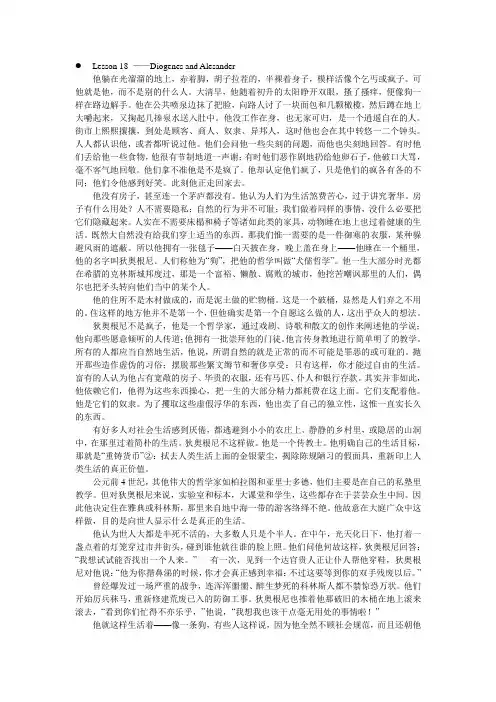
Lesson 18 ——Diogenes and Alesander他躺在光溜溜的地上,赤着脚,胡子拉茬的,半裸着身子,模样活像个乞丐或疯子。
可他就是他,而不是别的什么人。
大清早,他随着初升的太阳睁开双眼,搔了搔痒,便像狗一样在路边解手。
他在公共喷泉边抹了把脸,向路人讨了一块面包和几颗橄榄,然后蹲在地上大嚼起来,又掬起几捧泉水送入肚中。
他没工作在身,也无家可归,是一个逍遥自在的人。
街市上熙熙攘攘,到处是顾客、商人、奴隶、异邦人,这时他也会在其中转悠一二个钟头。
人人都认识他,或者都听说过他。
他们会问他一些尖刻的问题,而他也尖刻地回答。
有时他们丢给他一些食物,他很有节制地道一声谢;有时他们恶作剧地扔给他卵石子,他破口大骂,毫不客气地回敬。
他们拿不准他是不是疯了。
他却认定他们疯了,只是他们的疯各有各的不同;他们令他感到好笑。
此刻他正走回家去。
他没有房子,甚至连一个茅庐都没有。
他认为人们为生活煞费苦心,过于讲究奢华。
房子有什么用处?人不需要隐私;自然的行为并不可耻;我们做着同样的事情,没什么必要把它们隐藏起来。
人实在不需要床榻和椅子等诸如此类的家具,动物睡在地上也过着健康的生活。
既然大自然没有给我们穿上适当的东西。
那我们惟一需要的是一件御寒的衣服,某种躲避风雨的遮蔽。
所以他拥有一张毯子——白天披在身,晚上盖在身上——他睡在一个桶里,他的名字叫狄奥根尼。
人们称他为“狗”,把他的哲学叫做“犬儒哲学”。
他一生大部分时光都在希腊的克林斯城邦度过,那是一个富裕、懒散、腐败的城市,他挖苦嘲讽那里的人们,偶尔也把矛头转向他们当中的某个人。
他的住所不是木材做成的,而是泥土做的贮物桶。
这是一个破桶,显然是人们弃之不用的。
住这样的地方他并不是第一个,但他确实是第一个自愿这么做的人,这出乎众人的想法。
狄奥根尼不是疯子,他是一个哲学家,通过戏剧、诗歌和散文的创作来阐述他的学说;他向那些愿意倾听的人传道;他拥有一批崇拜他的门徒。
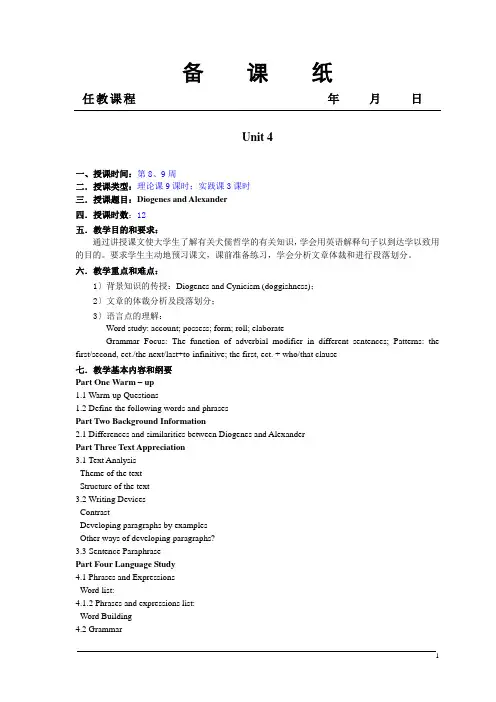
任教课程年月日Unit 4一、授课时间:第8、9周二.授课类型:理论课9课时;实践课3课时三.授课题目:Diogenes and Alexander四.授课时数:12五.教学目的和要求:通过讲授课文使大学生了解有关犬儒哲学的有关知识,学会用英语解释句子以到达学以致用的目的。
要求学生主动地预习课文,课前准备练习,学会分析文章体裁和进行段落划分。
六.教学重点和难点:1〕背景知识的传授:Diogenes and Cynicism (doggishness);2〕文章的体裁分析及段落划分;3〕语言点的理解:Word study: account; possess; form; roll; elaborateGrammar Focus: The function of adverbial modifier in different sentences; Patterns: the first/second, ect./the next/last+to-infinitive; the first, ect. + who/that clause七.教学基本内容和纲要Part One Warm – up1.1 Warm-up Questions1.2 Define the following words and phrasesPart Two Background Information2.1 Differences and similarities between Diogenes and AlexanderPart Three Text Appreciation3.1 Text AnalysisTheme of the textStructure of the text3.2 Writing DevicesContrastDeveloping paragraphs by examplesOther ways of developing paragraphs?3.3 Sentence ParaphrasePart Four Language Study4.1 Phrases and ExpressionsWord list:4.1.2 Phrases and expressions list:Word Building4.2 Grammar任教课程年月日ObjectPart Five Extension5.1 Group discussion八、教学方法和措施本单元将运用黑板、粉笔、多媒体网络辅助教学设备等教学手段,主要采用以学生为主体、教师为主导的任务型、合作型等教学模式,具体运用教师讲授法、师生讨论、生生讨论等方法进行教学。
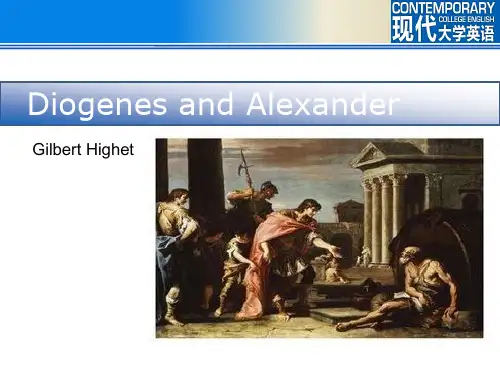
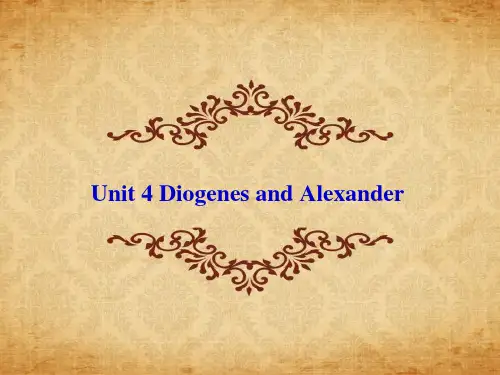

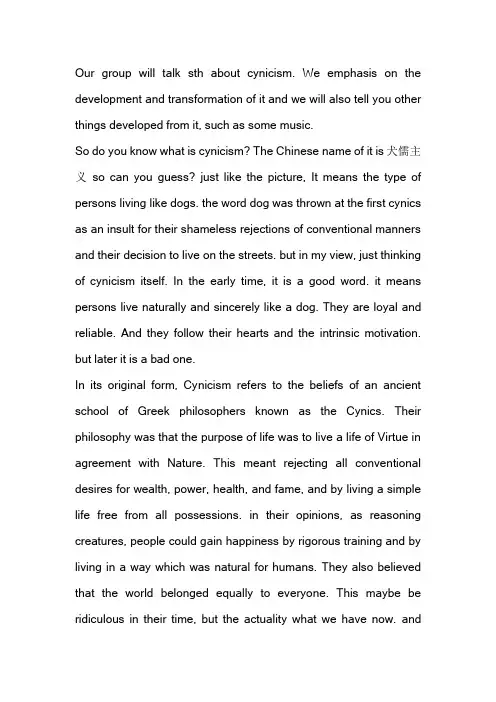
Our group will talk sth about cynicism. We emphasis on the development and transformation of it and we will also tell you other things developed from it, such as some music.So do you know what is cynicism? The Chinese name of it is犬儒主义so can you guess? just like the picture, It means the type of persons living like dogs. the word dog was thrown at the first cynics as an insult for their shameless rejections of conventional manners and their decision to live on the streets. but in my view, just thinking of cynicism itself. In the early time, it is a good word. it means persons live naturally and sincerely like a dog. They are loyal and reliable. And they follow their hearts and the intrinsic motivation. but later it is a bad one.In its original form, Cynicism refers to the beliefs of an ancient school of Greek philosophers known as the Cynics. Their philosophy was that the purpose of life was to live a life of Virtue in agreement with Nature. This meant rejecting all conventional desires for wealth, power, health, and fame, and by living a simple life free from all possessions. in their opinions, as reasoning creatures, people could gain happiness by rigorous training and by living in a way which was natural for humans. They also believed that the world belonged equally to everyone. This maybe be ridiculous in their time, but the actuality what we have now. andthey also think suffering was caused by false judgments of what was valuable and by the worthless customs and conventions which surrounded society. They required freedom and frankness, which politics disallowed.For example, there are some typical philosophers in the ancient time.Diogenes is considered one of the founders of Cynicism.Many anecdotes of Diogenes refer to his dog-like behavior, and his praise of a dog's virtues. Diogenes said:"I am Diogenes the Dog. I nuzzle the kind, bark at the greedy and bite scoundrels.Diogenes believed human beings live artificially and hypocritically and would do well to study the dog. As for a dog, it perform natural body functions in public with ease, a dog will eat anything, and make no fuss about where to sleep. Dogs live in the present without anxiety, and have no use for the pretensions of abstract philosophy. In addition to these virtues, dogs are thought to know who is friend and who is foe.There is a story about Diogenes, you can also find it in the book.Diogenes lived in a tub on the streets of Athens. One day, conqueror of half the civilize world, Alexander the Great, saw Diogenes sitting in this tub in the sunshine. So the king, surroundedby his countries, approached Diogenes and said,” I am Alexander the Great.” The philosopher replied rather contemptuously,” I am Diogenes, the Cynic.” Alexander then asked him if he could help him in any way." Yes,” shot back Diogenes," don't stand between me and the sun.” A surprised Alexander then replied quickly,” If I were not Alexander, I would be Diogenes."This is what cynicism perform in the early time. This thought can be found in many parts of the world. For example, in china, the persons of Chinese Taoism also held the similar thoughts. Chinese Taoism emphasizes living in harmony with the Tao. And tao is natural, ,eternal, nameless, and indescribable. It is the beginning of all things and the way in which all things pursue their course.There is a typical philosopher called Chuang Tzu. Chang Tzu advocates that men distance themselves from the traditional prestige and honor of worldly life, and think about what it means to simply live.There is a story about himZhuang Zhou onceinto a butterfly, flying in the air, like he free butterfly.In his dream he was amused withoutonly something in his dream. After a he up andand couldn't tell it was he turned into a butterfly in his dream or a butterfly turned into him.So you can see, cynicism and Chinese Taoism are alike in some parts.However, as the time flying, cynicism in the modern life is extremely different from the early meanings. And my partners will introduce you more information.。
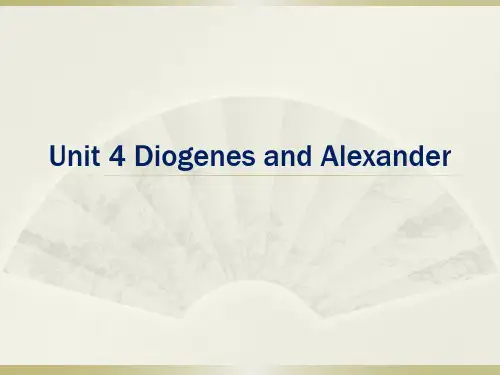


大学英语(四)DiogenesandAlexander戴奥吉尼斯和亚历山大Diogenes and Alexander 戴奥吉尼斯和亚历山大The Dog Has His DayGilbert HighetThis article by the late classicist Gilbert Highet describes a meeting between two sharply contrasting personalities of history: Alexander the Great and Diogenes. This selection originally appeared in Horizon, the first in a series entitled Great Confrontations.此文是由晚期著名的古典学者Gilbert Highet 所写,描述了历史上两位性格极端伟大人物的会面场面:亚历山大国王和戴奥吉尼斯。
本文选择来自Horizon,一篇名叫“伟大的会面”的开始部分。
Lying on the bare earth, shoeless, bearded, half-naked, he looked like a beggar or a lunatic(神经病,疯子). He was one, but not the other. He had opened his eyes with the sun at dawn (拂晓), scratched, done his business like a dog at the roadside, washed at the public fountain, begged a piece of breakfast bread and a few olives, eaten them squatting on the ground, and washed them down with a few handfuls of water scooped from the spring. (Long ago he had owned a rough wooden cup, but he threw it away when he saw a boy drinking out of his hollowed hands.) Having no work to go to and no family to provide for, he was free. As the market place filled up with shoppers and merchants and gossipers and sharpers (a cheater, esp. a cardsharper) and slaves and foreigners, he had strolled through it for an hour or two. Everybody knew him, or knew of him. They would throw sharp questions at him and get sharper answers. Sometimes they threw jeers, and got jibes; sometimes bits offood, and got scant thanks; sometimes a mischievous pebble, and got a shower of stones and abuse(漫骂). They were not quite sure whether he was mad or not. He knew they were mad, all mad, each in a different way; they amused him. Now he was back at his home. (周围的人们不能肯定他到底是不是真的疯了,但是他确是非常的肯定他们是真的疯了,以不同的方式和程度; 这个发现使他很开心好玩).It was not a house, not even a squatter's hut. He thought everybody lived far too elaborately, expensively, anxiously. What good is a house? No one needs privacy: natural acts are not shameful; we all do the same thing, and need not hide them. No one needs beds and chairs and such furniture: the animals live healthy lives and sleep on the ground. All we require, since nature did not dress us properly, is one garment to keep us warm, and some shelter from rain and wind. So he had one blanket—to dress him in the daytime and cover him at night—and he slept in a cask. His name was Diogenes. He was the founder of the creed called Cynicism (the word means "doggishness"); he spent much of his life in the rich, lazy, corrupt Greek city of Corinth, mocking and satirizing its people, and occasionally converting one of them.His home was not a barrel made of wood: too expensive. It was a storage jar made of earthenware, something like a modern fuel tank—no doubt discarded because a break had made it useless. He was not the first to inhabit such a thing: the refugees driven into Athens by the Spartan invasion had been forced to sleep in casks. But he was the first who ever did so by choice, out of principle.Diogenes was not a degenerate or a maniac(疯子). He was a philosopher who wrote plays and poems and essaysexpounding(解释) his doctrine; he talked to those who cared to listen; he had pupils who admired him. But he taught chiefly by example. All should live naturally, he said, for what is natural is normal and cannot possibly be evil or shameful. Live without conventions, which are artificial and false; escape complexities and superfluities and extravagances: only so can you live a free life. The rich man believes he possesses his big house with its many rooms and its elaborate furniture, his pictures and expensive clothes, his horses and his servants and his bank accounts. He does not. He is their slave. In order to procure a quantity of false, perishable goods he has sold the only true, lasting good, his own independence. (富人们都相信, 拥有了属于自己的豪华大房子,房间很多,装饰和家具都很精致和气派, 还有很多的名画和很昂贵的衣服, 马匹和佣人,还有银行账户上的很多的钱。
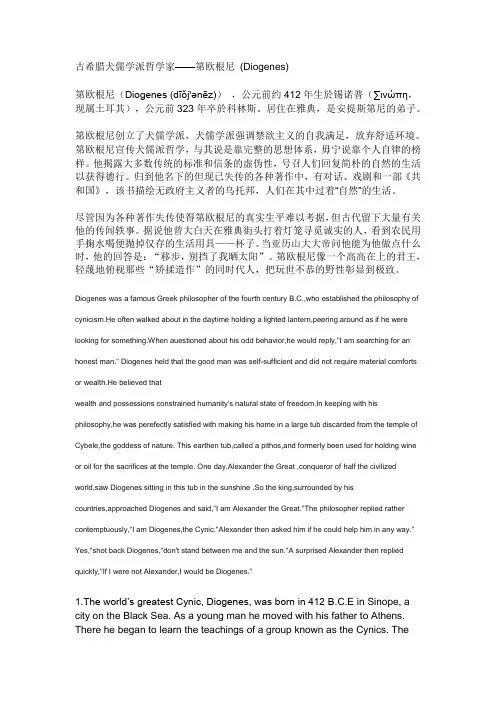
古希腊犬儒学派哲学家——第欧根尼(Diogenes)第欧根尼(Diogenes (dīŏj'ənēz)),公元前约412年生於锡诺普(∑ινώπη,现属土耳其),公元前323年卒於科林斯。
居住在雅典,是安提斯第尼的弟子。
第欧根尼创立了犬儒学派,犬儒学派强调禁欲主义的自我满足,放弃舒适环境。
第欧根尼宣传犬儒派哲学,与其说是靠完整的思想体系,毋宁说靠个人自律的榜样。
他揭露大多数传统的标准和信条的虚伪性,号召人们回复简朴的自然的生活以获得德行。
归到他名下的但现已失传的各种著作中,有对话、戏剧和一部《共和国》,该书描绘无政府主义者的乌托邦,人们在其中过着―自然‖的生活。
尽管因为各种著作失传使得第欧根尼的真实生平难以考据,但古代留下大量有关他的传闻轶事。
据说他曾大白天在雅典街头打着灯笼寻觅诚实的人,看到农民用手掬水喝便抛掉仅存的生活用具——杯子。
当亚历山大大帝问他能为他做点什么时,他的回答是:“移步,别挡了我晒太阳”。
第欧根尼像一个高高在上的君王,轻蔑地俯视那些“矫揉造作”的同时代人,把玩世不恭的野性彰显到极致。
Diogenes was a famous Greek philosopher of the fourth century B.C.,who established the philosophy of cynicism.He often walked about in the daytime holding a lighted lantern,peering around as if he were looking for something.When auestioned about his odd behavior,he would reply,"I am searching for an honest man." Diogenes held that the good man was self-sufficient and did not require material comforts or wealth.He believed thatwealth and possessions constrained humanity's natural state of freedom.In keeping with his philosophy,he was perefectly satisfied with making his home in a large tub discarded from the temple of Cybele,the goddess of nature. This earthen tub,called a pithos,and formerly been used for holding wine or oil for the sacrifices at the temple. One day,Alexander the Great ,conqueror of half the civilized world,saw Diogenes sitting in this tub in the sunshine .So the king,surrounded by hiscountries,approached Diogenes and said,"I am Alexander the Great."The philosopher replied rather contemptuously,"I am Diogenes,the Cynic."Alexander then asked him if he could help him in any way." Yes,"shot back Diogenes,"don't stand between me and the sun."A surprised Alexander then replied quickly,"If I were not Alexander,I would be Diogenes."1.The world‘s greatest Cynic, Diogenes, was born in 412 B.C.E in Sinope, a city on the Black Sea. As a young man he moved with his father to Athens. There he began to learn the teachings of a group known as the Cynics. Thename Cynic was derived from the Greek word ky-ni-kos which roughly translated as doglike and describes the antisocial behaviour of adherents of the belief. The cynics believed that fulfilment in life was to be obtained by the total abstinence from all worldly pleasures. To them, virtue was the only good. They became suspicious and contemptuous of others.The young Diogenes became a student of one of the founders of Cynicism, a man named Antisthenes. He became totally obsessed with the frugal lifestyle of the Cynics, taking the disowning of materialism to new heights. He did, in fact, become a dour ascetic.Diogenes became convinced that Cynicism and the total abstinence of the things of the world was the path to ultimate enlightenment. On one occasion he is said to have walked the streets of Athens in the middle of the day with a lighted lamp in search of a virtuous person. This type of eccentric behaviour was often used to draw attention to the Cynics and attract new recruits to the ranks of believers.On one memorable occasion Diogenes was approached by the great Alexander the Great. Alexander, apparently in an attempt to undermine the cynic belief, asked Diogenes what he wanted most in the world. Diogenes‘ answer? He wanted Alexander to step aside so that he was no longer blocking the Sun.Diogenes and his fellow Cynics as a result of their casting away all creature comforts, lived as beggars. They looked upon working for a living with utter disdain. They also rejected any civic duties or responsibilities. And, of course, they became bitterly sarcastic towards others.Diogenes, himself, was the master at showing disrespect and throwing sarcasm at others. As a result, he came to be referred to simply as ‗the dog.‘Diogenes died about 320 B.C.E, having lived for nine angry decades. His eccentricity and extreme antisocial behaviour proved to be the downfall of Cynicsm. The belief fell into disrepute soon after his passing. Within in time ithad disappeared all together. All that is left of it in our modern world is the word ‗cynic‘ which is used unfavourably to describe a person who is disposed to find fault with others, an unwitting imitator of the father of cynicism, Diogenes.2.AlexanderAlexander (Alexandros). 1. Alexander of Pherae (in Thessaly), nephew and successor of Jason, tyrant of Pherae 369–358 BC. He was opposed by most of the cities of Thessaly and allied himself with Athens to counteract Theban expansion. When the Theban general Pelopidas visited him on one of his expeditions, he detained the general as a hostage until the latter was eventually rescued by a second Theban expedition in 367. As the result of a fresh appeal from Thessaly in 364, Pelopidas marched against him and defeated him at Cynoscephalae, but was himself killed. Later, a larger Theban army defeated Alexander and forced him to become the ally of the Thebans. In 362 he felt free to make piratical raids against Athens and raided the Piraeus. He was assassinated in 358 by his wife's brothers.。
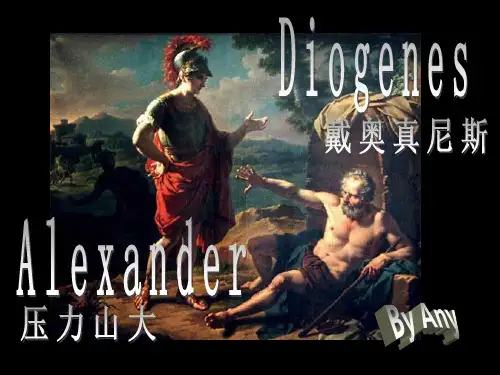
第欧根尼的木桶:应该努力地把自己列入特权阶层身在职场,你不能要求绝对的公平,不能要求任何人都拥有不属于自己的独特的权利。
一部分人之所以能那样,是因为他们本身有配得上那样做的贡献。
而如果你觉得不公平,你应该做的,就是努力地把自己列入特权阶层。
哲学能够使我们安心地躺在土地上晒太阳,享受身体和心灵的自由,而对一切妨碍我们这样做的东西说:“不要挡住我的阳光!”。
“不要挡住我的阳光”还可增加一个含义:不要让政治挡住哲学,不要让群体利益挡住思想自由。
只要记得一句话,就永远忘记不了第欧根尼,亚历山大说:如果我不是亚历山大,我希望我是第欧根尼。
第欧根尼的木桶谷歌的宣传部经理科里尼.达利是谷歌公司的名人,甚至比总裁还要具有知名度。
他有一间独立的办公室,在宣传部大办公室的东北角,三面都是透明的玻璃幕墙,挂着蓝色的百叶窗。
因为那些百叶窗的缘故,达利的秘密一直到秘书一次无意的闯入,才被发现。
原来,达利在拉上百叶窗时,习惯于脱去自己的上衣工作。
起初,大家都认为,这是达利对秘书的“主动”骚扰,可是,很快有人发现,达利在一年四季,春夏秋冬,只要进入办公室,拉上窗帘的时候,都喜欢赤膊。
总裁因此找他谈过话,结果此事不了了之,公司里传说,达利告诉总裁,在没有妨碍到他人的情况下,自己必须这样,因为这让自己更加具备灵感。
谷歌公司内部因此开始“大乱”。
有人在上班的时间,播放震耳欲聋的重金属音乐。
女员工们为了追求舒适,有人开始穿着宽松的睡衣上班。
原来就松散的整个谷歌公司被搅扰得一团糟糕。
为了恢复正常的办公秩序,不让公司内部气氛被破坏,公司开始警告一些过分的员工,这让大家有所收敛。
可是,公司却没有制约达利裸背的制度颁发下来。
上万封员工的意见信通过电邮,发送到总裁的邮箱。
这些电邮纷纷为达利没有受到警告并终止他的行为而感到不公。
几天后,谷歌的员工们收到了一封信,这封来自总裁办公室的邮件,讲述了一个古希腊哲学家第欧根尼的故事。
第欧根尼有个怪癖,那就是习惯住在木桶里,他没有自己的房间,没有家。
Unit 4 Diogenes and Alexanderbeard: hair that grows around a man's chin and cheeksmustache: hair that grows on a man's upper lipbearded: adj. having beardblock● a block of ice●She took the dog for a walk around the block.●Lack of training acts as a block to progress in a career.● A fallen tree is blocking the road.●tried to get through, but there were too many people blocking my way.●Can you move? You're blocking my light.●The huge building across the street blocked our view of the sea.elaborate: adj. very complicated and detailed; carefully prepared and organized●pure silks embroidered with elaborate patterns●an elaborate computer systemelaborately: adv. an elaborately decorated roomelaborate: v. to give more details or new information about something●He said he had new evidence, but refused to elaborate any further.elaborate on●McDonald refused to elaborate on his reasons for resigning.elegant(1)beautiful, attractive, or graceful● a tall, elegant young woman●an elegant room / restaurant(2)(of a plan or an idea) clever but simple●an elegant solution to the problemfountain(1) a structure from which water is pushed up into the air, used for example as decorationin a garden or park(2) a flow of liquid, or of something bright and colourful that goes straight up into the air fountain of● A fountain of blood was pouring from his chest.● A fountain of sparks shot high into the night sky.(3) a fountain of sth (written): a source or supply of something●Tourism is a fountain of wealth for the city.guffaw: to laugh loudlyother words to describe “laugh”half-nakedhalf-bloodedhalf-brother/sisterhalf-breedhalf-heartedlunatic: n. someone who behaves in a crazy or very stupid way; adj. extreme or dangerousmonarch: n. a king or queenmonarchy: the system in which a country is ruled by a king or queen; a country that is ruled by a king or queen●constitutional monarchy systemmonarchic/monarchical adj.●the old monarchical systemnudge(1)to push sb gently, especially with your elbow, in order to get their attention●H e nudged me and whispered, “Look who's just come in.”(2)to move forward slowly by pushing gentlynudge your way to/through etc (sth)●I started to nudge my way to the front of the crowd.oliveolive tree/groveolive oilolive greenolivebrancholive skin/complexionprivate n./adj.I need to speak to you in private.Saving Private Ryanprivate enterpriseprivate jokeprivate detective/eyeprivacy: n.scant: very little or not enoughscant regard: Peter had shown scant regard for her feelings.scant attention: Jen paid scant attention to their conversation.scoop/ladle/dipper/spoon (the Big Dipper)scratchHe was scratching at the bites on his arm.Don't worry; the cat won't scratch you.This crisis has politicians scratching their heads and wondering what to do.He had built the business up from scratch.squat v.(1)to sit with your knees bent under you and your bottom just off the ground, balancingon your feet●He squatted down beside the little girl.(2)to live in a building or on a piece of land without permission and without paying rent n.(1) a squatting position of the body(2) a building that people are living in without permission and without paying rent: to live in a squatsquatter n.stroll v./n. to walk somewhere in a slow relaxed way●She strolled over to join them.●Let's go for a stroll.Sweat v.(1)to have drops of salty liquid coming out through your skin because you are hot, ill,frightened, or doing exerciseI was sweating a lot despite the air-conditioning.Within minutes she was sweating profusely /heavily.He was sweating buckets (= a lot).(2)to work very hardThey sweated and saved for ten years to buy a house.I sweated blood to get that report finished.。
Lesson 18 ——Diogenes and Alesander他躺在光溜溜的地上,赤着脚,胡子拉茬的,半裸着身子,模样活像个乞丐或疯子。
可他就是他,而不是别的什么人。
大清早,他随着初升的太阳睁开双眼,搔了搔痒,便像狗一样在路边解手。
他在公共喷泉边抹了把脸,向路人讨了一块面包和几颗橄榄,然后蹲在地上大嚼起来,又掬起几捧泉水送入肚中。
他没工作在身,也无家可归,是一个逍遥自在的人。
街市上熙熙攘攘,到处是顾客、商人、奴隶、异邦人,这时他也会在其中转悠一二个钟头。
人人都认识他,或者都听说过他。
他们会问他一些尖刻的问题,而他也尖刻地回答。
有时他们丢给他一些食物,他很有节制地道一声谢;有时他们恶作剧地扔给他卵石子,他破口大骂,毫不客气地回敬。
他们拿不准他是不是疯了。
他却认定他们疯了,只是他们的疯各有各的不同;他们令他感到好笑。
此刻他正走回家去。
他没有房子,甚至连一个茅庐都没有。
他认为人们为生活煞费苦心,过于讲究奢华。
房子有什么用处?人不需要隐私;自然的行为并不可耻;我们做着同样的事情,没什么必要把它们隐藏起来。
人实在不需要床榻和椅子等诸如此类的家具,动物睡在地上也过着健康的生活。
既然大自然没有给我们穿上适当的东西。
那我们惟一需要的是一件御寒的衣服,某种躲避风雨的遮蔽。
所以他拥有一张毯子——白天披在身,晚上盖在身上——他睡在一个桶里,他的名字叫狄奥根尼。
人们称他为“狗”,把他的哲学叫做“犬儒哲学”。
他一生大部分时光都在希腊的克林斯城邦度过,那是一个富裕、懒散、腐败的城市,他挖苦嘲讽那里的人们,偶尔也把矛头转向他们当中的某个人。
他的住所不是木材做成的,而是泥土做的贮物桶。
这是一个破桶,显然是人们弃之不用的。
住这样的地方他并不是第一个,但他确实是第一个自愿这么做的人,这出乎众人的想法。
狄奥根尼不是疯子,他是一个哲学家,通过戏剧、诗歌和散文的创作来阐述他的学说;他向那些愿意倾听的人传道;他拥有一批崇拜他的门徒。